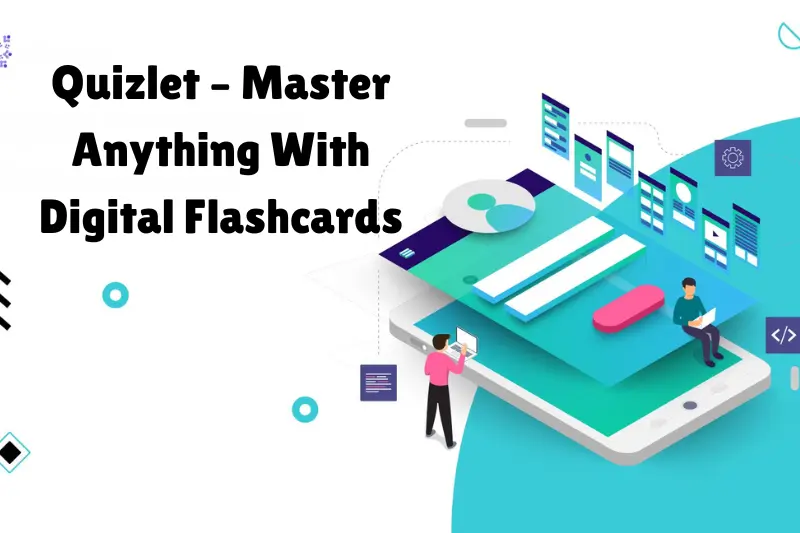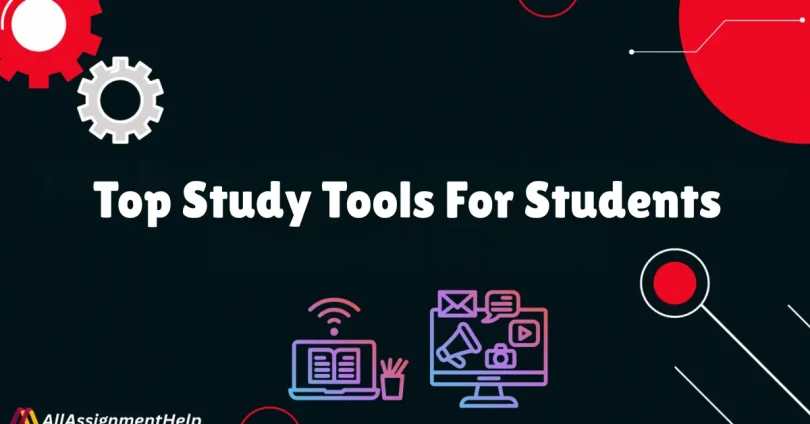Let’s be honest—staying focused on schoolwork can feel almost impossible these days. Between endless YouTube videos, trending TikToks, and scrolling through Reddit, it’s easy to get sidetracked before you even finish your first paragraph. Imagine this: you sit down to study for your math test, but an hour later, you’re still watching funny videos instead of solving equations.
Here’s the good news: the same internet that distracts you is also full of top study tools for students that can actually make learning easier, faster, and even enjoyable. Whether you’re trying to cram for exams, keep up with assignments, or just find a smarter way to study, the right tools can completely transform your routine.
To help you out, we’ve ranked the top study tools for students that boost focus, organization, memorization, and overall productivity—so you can study smarter, not harder.
1. Quizlet – Master Anything With Digital Flashcards

Quizlet has earned its spot as a favorite among students worldwide. This versatile platform allows you to create your own flashcards or use sets created by other learners. The interactive modes like Learn, Match, and Test make reviewing material less tedious and more engaging.
The mobile app is especially useful for studying on the go—perfect for short breaks or bus rides to school. Plus, you can join study groups and share flashcards with classmates, turning solo study sessions into collaborative learning experiences.
Why it’s great: Ideal for memorization, self-testing, and group study sessions.
2. Google Keep – Organize Your Notes Like a Pro
Google Keep is perfect for students who struggle to keep notes organized. You can create color-coded notes, make to-do lists, set reminders, and even attach images or voice recordings. Collaboration is a breeze, too—just share notes with classmates and work together on group projects or study plans.
Pro Tip: Use labels and categories to sort your notes by subject or priority. This helps you find what you need quickly and reduces study stress.
Why it’s great: Efficient for note-taking, task management, and staying organized.
3. Khan Academy – Learn at Your Own Pace
Khan Academy is a lifesaver for students who need clear explanations and practice exercises. Covering subjects from math, science, and economics to history, it provides step-by-step lessons and progress tracking. Its adaptive learning system highlights areas where you need improvement, making your study sessions more effective.
Pro Tip: Use the practice exercises after watching each lesson to reinforce what you learned.
Why it’s great: Offers structured, free lessons with interactive exercises to improve understanding.
You may also like to read this:
Career Growth Vs Career Change: Key Differences Explained
What Are Study Tools? Tips For Effective Learning
Top 12 Types of Digital Study Tools For Smarter Learning
How To Use Study Apps Effectively: Complete Guide
Why Study Tools Help In Learning: Tips For Academic Success
4. Forest – Beat Procrastination and Stay Focused
If you struggle with phone distractions, Forest is a game-changer. You plant a virtual tree that grows while you focus on your studies. If you exit the app to check social media, the tree dies. The result? A simple yet powerful motivator to keep your attention on studying.
Pro Tip: Set a timer for focused study sessions and watch your forest grow. Over time, you’ll visually see your productivity.
Why it’s great: Encourages focus, time management, and building self-discipline.
5. Grammarly – Write Smarter, Not Harder
Writing essays, reports, or emails can feel overwhelming, especially with strict grammar rules. Grammarly acts as a personal writing assistant, checking for spelling errors, sentence structure, clarity, and style suggestions. This tool is perfect for polishing assignments or improving general writing skills.
Pro Tip: Use the tone detector to ensure your writing is formal or casual, depending on the assignment.
Why it’s great: Enhances writing quality and helps students communicate effectively.
6. Trello – Plan and Prioritize Like a Pro
Trello is a visual project management tool that’s perfect for students juggling multiple assignments or exams. You can create boards for subjects, deadlines, and even group projects. Each task is represented as a card, which you can move through different stages of completion, helping you track progress efficiently.
Pro Tip: Color-code cards by subject or priority level to quickly identify urgent tasks.
Why it’s great: Streamlines organization, prioritization, and collaboration.
7. Duolingo – Make Language Learning Fun
Learning a new language can be intimidating, but Duolingo turns it into a game. With streaks, points, and levels, it keeps students motivated while teaching vocabulary, grammar, and pronunciation. Its bite-sized lessons make it easy to practice daily without feeling overwhelmed.
Pro Tip: Set a daily goal and use notifications to maintain consistency. Even 10 minutes a day can make a big difference.
Why it’s great: Fun, gamified learning that fits into any schedule.
8. Anki – Spaced Repetition for Serious Memorization
Anki is a powerful flashcard app that uses spaced repetition—a proven memorization technique—to help students retain large volumes of information. It’s especially popular among medical, law, and language students but works for any subject requiring memorization.
Pro Tip: Customize your decks with images, audio, or mnemonics to make memorization more effective.
Why it’s great: Perfect for long-term retention and mastering complex topics.
9. Evernote – Your Digital Notebook

Evernote is a versatile tool for capturing ideas, organizing research, and keeping study materials in one place. You can attach PDFs, scan handwritten notes, clip articles from the web, and even record audio reminders. Its powerful search function ensures you never lose important information.
Pro Tip: Use notebooks and tags to categorize your notes by subject or project.
Why it’s great: Ideal for note organization, research, and cross-device syncing.
10. Edmodo – Connect, Share, and Learn
Edmodo functions like a social network for students and teachers. It provides a centralized platform for submitting assignments, accessing class materials, and engaging in discussion forums. This makes it especially useful for remote learning and group collaboration.
Pro Tip: Join subject-specific groups to share resources and ask questions.
Why it’s great: Facilitates communication, collaboration, and easy access to educational content.
11. Notion – All-in-One Study Workspace
Notion is a versatile tool that combines note-taking, task management, and project planning in one platform. Students can create personalized dashboards for assignments, exams, and study plans. With templates for study schedules, trackers, and calendars, Notion helps you keep everything in one place.
Pro Tip: Use pre-made templates for subjects or exams to save time and stay organized.
Why it’s great: Combines note-taking, task management, and productivity tracking in a single app.
12. Microsoft OneNote – Digital Notebook for Organization
OneNote is similar to Evernote but integrates seamlessly with Microsoft Office. Students can organize notes by sections and pages, draw diagrams, highlight key points, and even record audio during lectures. Cross-device syncing ensures your notes are always accessible.
Pro Tip: Use the “Draw” feature to create mind maps and visualize concepts for better memory retention.
Why it’s great: Ideal for students who like structured digital notebooks with multimedia support.
13. Pomofocus – Master Time Management with Pomodoro
Pomofocus is a simple online timer based on the Pomodoro Technique. You study in short, focused bursts (typically 25 minutes) followed by a short break. This method improves concentration and prevents burnout.
Pro Tip: Combine Pomofocus with Forest for a fun, visual way to track focus and study time.
Why it’s great: Enhances focus and productivity using scientifically proven time management techniques.
14. Coursera – Learn From Top Universities
Coursera offers online courses from renowned universities and institutions. While some courses are paid, many are free and cover topics across science, technology, business, and arts. This platform is perfect for students who want in-depth knowledge beyond textbooks.
Pro Tip: Audit free courses to access video lectures and assignments without paying.
Why it’s great: Offers high-quality educational content for deeper understanding and skill-building.
15. Wolfram Alpha – The Ultimate Knowledge Engine
Wolfram Alpha is more than a search engine—it’s a computational knowledge tool. Students can solve math problems, generate graphs, and explore scientific queries. It’s especially helpful for STEM subjects and complex calculations.
Pro Tip: Use step-by-step solutions for math and science problems to learn the process, not just the answer.
Why it’s great: Helps with problem-solving, calculations, and deeper understanding of complex concepts.
16. Quizizz – Fun, Gamified Quizzes
Quizizz is a gamified learning platform that allows teachers and students to create interactive quizzes. You can study solo or join multiplayer games for a competitive twist. Its real-time feedback helps you quickly identify areas that need improvement.
Pro Tip: Use it for self-testing before exams to make studying fun and engaging.
Why it’s great: Combines learning and gaming for interactive and engaging study sessions.
17. SimpleMind – Mind Mapping Made Easy
SimpleMind allows students to visually organize thoughts, brainstorm ideas, and create study maps. Mind maps help in memorizing complex topics by connecting concepts and breaking down information visually.
Pro Tip: Use color coding and icons in your mind maps to make them visually memorable.
Why it’s great: Improves memory retention and helps with brainstorming and essay planning.
18. Coggle – Collaborative Mind Mapping
Coggle is another mind mapping tool, but with a collaborative twist. Students can work together in real time to create diagrams, brainstorm ideas, or outline projects. It’s great for group assignments and visual learners.
Pro Tip: Link resources and notes directly to branches in your mind map for easy reference.
Why it’s great: Encourages collaborative learning and visual organization of complex topics.
19. Brainscape – Adaptive Flashcards
Brainscape uses adaptive learning algorithms to help students memorize content more efficiently. By repeating flashcards at optimal intervals, it ensures long-term retention. It’s perfect for exam prep and vocabulary learning.
Pro Tip: Focus on weaker topics first—the app automatically prioritizes them for better results.
Why it’s great: Efficient memorization with adaptive flashcards for smarter studying.
20. StudyBlue – Build Your Personalized Study Library
StudyBlue lets students create and share digital flashcards, notes, and study guides. You can track your progress, set reminders, and collaborate with classmates. It’s ideal for students who prefer a personalized study library at their fingertips.
Pro Tip: Use pre-made decks for popular subjects to save time while still learning effectively.
Why it’s great: Combines personalized study materials with progress tracking and collaboration.
How to Choose the Right Study Tools for You
While all the tools we’ve ranked are fantastic, the key to maximizing productivity is choosing the ones that suit your learning style. Here’s a quick guide to help you pick the best fit:
- Visual Learners: Tools like Quizlet, Trello, and Forest work wonders. Flashcards, color-coded boards, and visual progress trackers help you retain information better.
- Auditory Learners: Apps like Khan Academy (with video lessons) and Evernote (audio note recording) let you learn by listening.
- Kinesthetic Learners: Interactive tools such as Duolingo and Anki let you actively participate in learning, making memorization more effective.
- Highly Distractable Students: Forest and Trello help you stay on task and manage your time efficiently.
Combining Tools for Maximum Productivity
One of the secrets to effective studying is using multiple tools together. For example:
- Start with Trello: Plan your study schedule and deadlines.
- Use Quizlet or Anki: Memorize key concepts and definitions.
- Add Google Keep or Evernote: Take organized notes while studying.
- Polish Your Work with Grammarly: Perfect your essays and assignments.
- Stay Focused with Forest: Use timed study sessions without distractions.
By combining these tools, you create a seamless study ecosystem that covers planning, learning, memorization, and productivity.
Tips for Getting the Most Out of Study Tools
- Set Daily Goals: Even 15–30 minutes of focused study on a specific topic can add up.
- Take Regular Breaks: Use the Pomodoro technique with tools like Forest to prevent burnout.
- Collaborate with Peers: Share resources and flashcards to enhance understanding.
- Track Your Progress: Regularly review completed tasks, mastered flashcards, and notes to stay motivated.
- Avoid Overloading: Using too many apps at once can be overwhelming. Stick to 3–5 tools that truly help you.
Why Using Study Tools Matters
Investing time in the right study tools can change the way you learn. Here’s why:
- Efficiency: Reduce wasted time searching for notes, organizing tasks, or figuring out what to study next.
- Retention: Tools like Anki and Quizlet use proven techniques to help you remember information longer.
- Motivation: Gamified apps like Duolingo and Forest turn studying into a fun challenge.
- Organization: Trello, Google Keep, and Evernote keep all your study materials in one place.
By integrating these tools into your routine, you can study smarter, not harder.
Conclusion
Staying focused as a student can be challenging, but the right top study tools for students can make learning easier, faster, and more effective. From Quizlet and Anki to Trello and Forest, these tools help with memorization, organization, time management, and motivation.
Pick the tools that fit your learning style and combine them for maximum productivity. You don’t need every app—just the ones that truly support your study habits. Start using these top study tools for students today to turn your study sessions into smarter, more productive, and rewarding experiences.
FAQs: Top Study Tools for Students
1. What are the best study tools for students?
The best study tools for students include Quizlet, Anki, Trello, Forest, Google Keep, Notion, Evernote, Grammarly, Khan Academy, and Duolingo. These tools help with memorization, organization, time management, and focused learning.
2. Are these study tools free?
Many of the top study tools for students are free, like Quizlet, Khan Academy, Duolingo, and Google Keep. Some platforms, such as Coursera or Grammarly, offer premium features, but their free versions are highly effective for students.
3. Which study tool is best for memorization?
Apps like Quizlet, Anki, and Brainscape are ideal for memorization. They use flashcards and spaced repetition techniques to help retain information long-term.
4. Which tools help with focus and time management?
Forest and Pomofocus are excellent for improving focus and managing study time. Forest gamifies concentration, while Pomofocus uses the Pomodoro technique to balance work and breaks.
5. Can I use these tools for group projects?
Yes! Tools like Trello, Notion, Edmodo, and Coggle allow collaboration, letting students share notes, plan projects, and work together efficiently.




